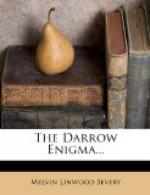Gwen made no reply, but we heard no more of her resignation. She applied herself at once to the preparation of her paper upon “Antony and Cleopatra.” Maitland, who, like all vigorous, healthy, and informed intellects, was an ardent admirer of Shakespeare, found time to call on Gwen and to discuss the play with her. This seemed to please her very much, and I am sure his interest in the play was abnormal. He confessed to me that every morning, as he awoke, the first thing which flashed into his mind, even before he had full possession of his senses, was these words of Antony:
“I am dying, Egypt, dying.”
He professed himself utterly unable to account for this, and asked me what I thought was the cause of it. He furthermore suddenly decided that he would ask Gwen to propose his name for membership at the next meeting of the Young People’s Club. I hastily indorsed this resolution, for I had a vague sort of feeling that it would please Gwen.
The “Antony and Cleopatra” night at length arrived. We all attended the meeting and listened to a very able paper upon the play. One of the most marked traits of Gwen’s character is that whatever she does she does thoroughly, and this was fully exemplified on the night in question. Maitland was very much impressed by some verse Gwen had written for the occasion, and a copy of which he succeeded in procuring from her. I think, from certain remarks he made, that it was the broad and somewhat unfeminine charity expressed in the verse which most astonished and attracted him, but of this, after what I have said, you will, when you have perused it, be as good a judge as I:
Cleopatra
In Egypt, where the
lotus sips the waters
Of ever-fruitful Nile,
and the huge Sphinx
In awful silence,—mystic
converse with
The stars,—doth
see the pale moon hang her crescent on
The pyramid’s
sharp peak,—e’en there, well in
The straits of Time’s
perspective,
Went out, by Caesarean
gusts from Rome,
The low-burned candle
of the Ptolemies:
Went out without a flicker
in full glare
Of noon-day glory.
When her flame lacked oil
Too proud was Egypt’s
queen to be
The snuff of Roman spirits;
so she said,
“Good-night,”
and closed the book of life half read
And little understood;
perchance misread
The greater part,—yet,
who shall say? Are we
An ermined bench to
call her culprit failings up
And make them plead
for mercy? Or can we,
Upon whom soon shall
fall the awful shadow of
The Judgment Seat, stand
in her light and throw
Ourselves that shadow?
Rather let fall upon
Her memory the softening
gauze of Time,
As mantle of a charity
which else
We might not serve.
She was a woman,
And as a woman loved!
What though the fierce
Simoom blew ever hot




